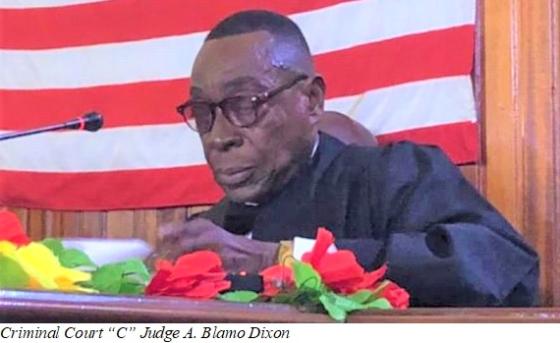Liberia: Judge Dixon Accuses Boakai of Nepotism, Tribalism

— Says the President is favoring his kinsmen over other Liberians; Claims that 14 Out of every 20 appointments the President makes come from his native Lofa County
The Resident Judge of Criminal Court ‘C’, Blamo Dixon, has added his voice to a debate over the alleged inclusion of several members of President Joseph Boakai’s tribal members into top governmental positions.
Judge Dixon raised concerns regarding the alleged prevalence of nepotism and tribalism in President Joseph Boakai’s appointments, citing a disproportionate representation of individuals from Lofa County in government roles.
“I have observed that every ten (10) persons appointed in government by President Joseph Boakai, seven (7) of those persons hail from Lofa County,” Dixon claims. “For every twenty (20) persons appointed in the government, fourteen (14) of those persons hailed from Lofa County. Yet, there are blunders made in the appointment process that need to be corrected,” Judge Dixon noted. Adding, “President Boakai’s latest batch of appointments is no exception.”
Judge Dixon spoke on this issue during an event at the D. Twe Memorial High School last week, when he served as a guest speaker at the Induction and fundraising program of the leadership elect of the D. Twe Memorial High School in the New Kru Town Community, Monrovia.
While Dixon did not provide details to justify his claims against the President, he emphasized the need for transparency and fair practices in the appointment process.
While the Constitution grants the President of Liberia the authority to nominate and appoint officials with the Senate’s consent, Dixon highlighted a historical pattern of relatives and kinsmen serving in government positions under past administrations, spanning various political backgrounds.
The most famous examples, Judge Dixon said, were Presidents Samuel K. Doe, Late Dr. Amos C Sawyer, Gyude Bryant, Charles Taylor, Ellen Johnson Sirleaf, and George M. Weah.
“The True Wig Party, Charles Taylor, and Ellen Johnson Sirleaf’s government were all dominated by Americo-Liberian inhabitants,” Dixon noted. “Samuel K Doe’s government was for the Krahn people. Amos Sawyer Government was for the Movement of Justice in Africa and the Students’ Unification party at the University of Liberia Group. Gyude Bryant’s government was for the disbanded Warring Factions and George Weah's government was for the South Easterners.”
Dixon further informed the students that it was under the People’s Redemption Council regime of President Samuel K Doe that constituted the People’s Theft Court, after the 1980 coup d’état, which court is referred to as the first judicial circuit, Criminal Court ‘C’ for Montserrado County to fight corruption.
“The said court remains the only Anti-Corruption court responsible for adjudicating corruption and economic crimes cases; such as Economic Sabotage, Money Laundering, Theft, and theft related cases,” Dixon emphasized.
Discussing corruption as a societal issue, Judge Dixon stressed the importance of combating practices like tribalism, nepotism, and favoritism as forms of corruption
He described corruption as a social menace that is gradually eating the fabric of the Liberian Society and needs to be eliminated.
“Corruption is not only limited to stealing money, but tribalism, nepotism, and favoritism are all forms of corruption,” Dixon noted.
An evaluation of the President’s appointments thus far indicates a notable concentration of officials from Lofa County, the President’s place of origin.
The appointments have seen various key positions filled by individuals from Lofa County, including roles like the Mayor of Monrovia, Chief of Staff of the Armed Forces, the Minister of Internal Affairs-designate, Ministry of Youth and Sports, LISGIS, Deputy Minister of Public Works, Ministry of Commerce and Industry, the head of the Liberia Revenue Authority, the Minister of Education, Deputy Minister for Administration, General Services Agency, Assistant Minister for Special Services, Minister of States without Portfolio, Managing Director, Liberia Telecommunications Corporation, Director, and General Corporation Development Agency.
Out of the initial 39 government officials appointed before February 8, 2024, fifteen hail from Lofa County. There has been more since that time — an indication that there is no clear departure from the past when it comes to Presidents favoring their kinsmen for top jobs.
However, other counties, as of February, had received varying numbers of ministerial positions. Bong County was allotted three ministers; Bomi, Grand Bassa and Nimba Counties, two cabinet officials each; and Sinoe and Grand Cape Mount Counties had one cabinet minister each.
Southeastern Liberia, which comprises six counties, including Grand Gedeh, Sinoe, Maryland, Grand Kru, Rivergee, and Rivercess, had received a single ministerial position at that time.
These developments contrast a commitment President Boakai made that he would ensure a fair distribution of ministerial positions across counties to prevent any single group from dominating the government. He emphasized the importance of promoting national unity and inclusivity in governance during his campaign. However, the current composition of the government has stirred differing opinions among Liberians and various groups nationwide.
Meanwhile, Judge Dixon also commented on the process of dismissing tenure holders, recommending a fair and transparent approach that aligns with administrative law and civil service regulations. He said the process was marred by inefficiency and errors.
He said that if President Boakai was interested in dismissing tenure holders, he should have invited them to a meeting and requested a performance report for the period they had served under President George Weah.
“Thereafter, a way forward can be derived because under the administrative law or the civil service code, you have to dismiss an employee before he or she can be replaced with another employee,” Dixon argued.
“Two persons cannot do the same job at the same time or simply put it two persons cannot occupy the same office at the same time.”
Judge Dixon’s remarks underscore the significance of ethical governance and accountability in public service appointments and the need to address corruption in all its forms for the betterment of Liberian society.
